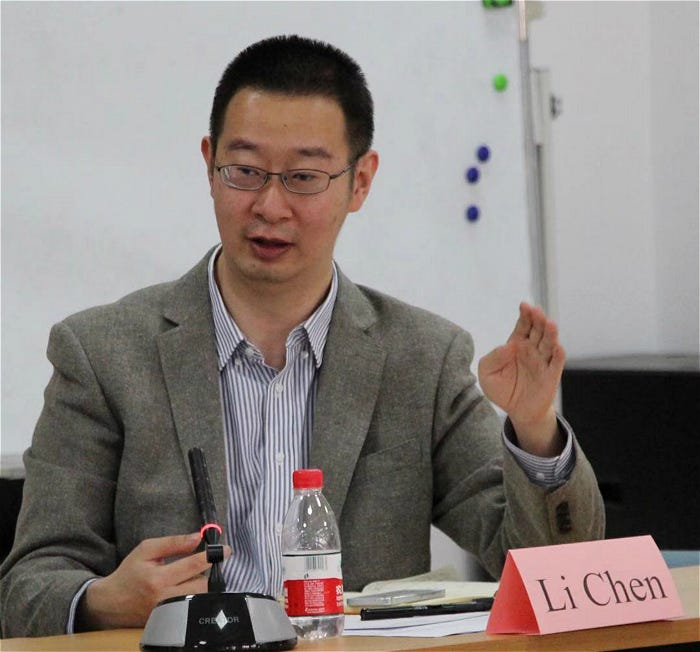Li Chen on Global Security Initiative
RUC's IR scholar says China must not approach international security solely from a "position of strength"; landmark achievements are not essential now, and a lot of patience is needed.
In April 2022, Xi Jinping, the Chinese President, proposed the Global Security Initiative (GSI).
-- We stay committed to the vision of common, comprehensive, cooperative and sustainable security, and work together to maintain world peace and security;
-- We stay committed to respecting the sovereignty and territorial integrity of all countries, uphold non-interference in internal affairs, and respect the independent choices of development paths and social systems made by people in different countries;
-- We stay committed to abiding by the purposes and principles of the UN Charter, reject the Cold War mentality, oppose unilateralism, and say no to group politics and bloc confrontation;
-- We stay committed to taking the legitimate security concerns of all countries seriously, uphold the principle of indivisible security, build a balanced, effective and sustainable security architecture, and oppose the pursuit of one's own security at the cost of others' security;
-- We stay committed to peacefully resolving differences and disputes between countries through dialogue and consultation, support all efforts conducive to the peaceful settlement of crises, reject double standards, and oppose the wanton use of unilateral sanctions and long-arm jurisdiction;
-- We stay committed to maintaining security in both traditional and non-traditional domains, and work together on regional disputes and global challenges such as terrorism, climate change, cybersecurity and biosecurity.
World Affairs, a magazine under the Ministry of Foreign Affairs of China, recently organized a roundtable on the GSI and invited six scholars to discuss it.
One of them is Li Chen, associate professor, Director of the Center for International Security and Strategy, and Vice Dean at the School of International Studies at Renmin University of China.
With a Ph.D. from the University of Cambridge and double masters degree from Peking University and London School of Economics and Political Science, Li is one of the few scholars employed by a Chinese university to have published in Foreign Affairs in recent years.
The following article was published in World Affairs, Issue 19, 2024. It is also available on the official WeChat blog of CISS of Tsinghua University, where Li is also affiliated.
My takeaway is the historian believes the GSI is fundamentally different from the U.S.-led Western approach to security, and, for example, in no way implies a rush to compete with the U.S. in establishing overseas bases to cultivate the sort of security governance that Washington has practiced. The success of the GSI depends on China adopting a prudent, long-term approach, rather than overplaying its hand. Instead, China should focus on what it can realistically achieve, exercising patience and refining its proposal over time.
I think Li was essentially saying China must temper its expectations regarding its role in mediating international crises, such as the ongoing war in Ukraine. While China has the potential to contribute to peace diplomacy, its influence is limited, and it should act cautiously within its capabilities. Rather than seeking immediate results, the GSI should be seen as a concept that requires gradual refinement and widespread consensus-building, much like other progressive international ideas that have evolved and gained acceptance through time and careful implementation.
Li kindly authorized a translation but hasn’t reviewed it. - Zichen
Li Chen: Implementing the Global Security Initiative Requires Combining It with Conceptual Innovation
李晨:落实全球安全倡议需要与思想观念创新相结合
The Global Security Initiative (GSI) proposal has its clear contemporary context. In the typical post-Cold War era, regardless of their differing values or security interests, the international community believed that security issues naturally had their paths for resolution. At that time, the global order was, for a time, unipolar, and the United States had more initiative in handling major power relations and regional hotspot issues, sometimes being willing to allocate strategic resources to provide some public goods necessary for global security.
However, times have changed. On one hand, strategic competition between major powers has returned to the forefront of the international agenda, with the traditional superpower less willing to coordinate on international security issues and committing fewer resources. On the other hand, the Western and U.S.-led global security governance, which continues to cling to its historical reliance on alliance networks and military means, is quickly losing its legitimacy and effectiveness. In this context, it is natural for China, an emerging major country that has successfully risen, to put forward its globally-minded security proposals, explore a security initiative with its characteristics, and subsequently attract worldwide attention.
Committing to Innovative Ideas and Improving Global Security Governance
In late 2022, while listening to a video seminar at the Xiangshan Forum in Beijing, I noticed that a U.S. Embassy defense attaché asked a Chinese representative how China, without global military bases or an alliance system, intended to implement the GSI. In the spring of 2023, I attended an international conference hosted by Tsinghua University's Center for International Security and Strategy (CISS), where a U.S. scholar remarked that implementing the GSI must be based on mature and efficient global strategic resource allocation and military security deployment. This would cost money — possibly hundreds of billions to a trillion dollars. Is China prepared for such an expenditure? These questions reflect the entrenched U.S. strategic thinking and the fundamental differences between Chinese and Western security concepts.
To successfully implement the GSI, China must avoid getting trapped in the paradigms of the U.S. and the West and allowing others to dictate its path and operations. In other words, China must not, like the West, approach international security issues solely from a position of strength. Such an approach does not win hearts and minds. For decades, the U.S. and the West, driven by a position-of-strength mindset and relying on a collective defense model, have abused sanctions and containment measures, making countless strategic mistakes in dealing with international security affairs. Rather than resolving issues, the U.S. and the West have consistently created new trouble, as seen in many lessons learned from history. As China advances the implementation of the GSI, it must innovate in both concept and paradigms, guiding the world toward a more just, reasonable, and inclusive model of global security governance, while offering values that can be upheld and passed down through generations by all of humanity.
However, it would be a mistake to dismiss the U.S. and Western strategic communities' explorations of security approaches or ignore its insights for China advancing the GSI. In April, during a meeting in the U.S., I had a conversation with Harvard University professor Alastair Iain Johnston. He acknowledged that the GSI, to some extent, draws from security concepts developed from lessons learned during the Cold War, such as common security and the indivisibility of security, presenting new opportunities for development and refinement.
Seeking Truth from Facts and Reasonably Leveraging China’s Influence
I believe that a fundamental premise for successfully implementing the GSI is to build consensus among all parties, which, as with any other international consensus, must draw on the wisdom of all involved. This requires China to systematically review the various categories and schools of security approaches, ideas, and frameworks in today's world, distinguishing the genuine from those misaligned with reality and the essential from the inconsequential, while actively promoting the spirit of internationalism. Relying solely on China's own proposals is not enough—many hands accomplish greater things.
Implementing the GSI also requires patience and ongoing refinement during quieter periods. In the history of contemporary international relations, many positive concepts did not gain widespread support immediately after being proposed; instead, they were often met with misunderstanding and criticism. Particularly in times of intense great power competition and conflict, such misunderstandings and criticisms can become even more numerous and pronounced.
When a new progressive concept is put forward by the government of a country, it is often misinterpreted as a tool and offensive for undermining the opponent's unity and gaining influence. When the GSI was first proposed, many international discussions suggested it was a tool for China to compete with the U.S. for influence, a narrative to fill the vacuum left by America's retreat from regions like the Middle East, or propaganda for a global influence campaign. While refuting such claims with reason is essential, it’s equally crucial to remain patient, move forward steadily, and let time and facts speak for themselves.
There is good reason for confidence. Many progressive concepts for international order and global security that emerged since the 20th century only revealed the brilliance they deserved after refinement over time. When conflicts are ongoing or have just ended, concepts arising from the tragedies may not immediately gain widespread acceptance because the sheer number of problems exposed and caused by conflicts can overwhelm public opinion. Meanwhile, many concepts need to be continuously developed and refined in practice to become more grounded and persuasive. The most typical example is Wilsonianism. After its proposal, the multilateralism concept it entailed was considered too idealistic for an extended period after the First World War and was not effectively implemented, ultimately ending in failure (for instance, in the operation of the League of Nations). However, after two decades of refinement and learning from the lessons of both world wars, the multilateralism concept was enhanced in its specifics and institutional structures. It played a crucial role in the construction of the post-World War II international order, eventually gaining widespread international consensus and leading to real policy outcomes that continue to benefit the world today.
As for whether a few landmark achievements are necessary to reflect the actual value of the GSI, I believe there is no need to rush for results. Instead, it is important to respect the inherent laws of development. When viewed from a third-party perspective, almost all international conflicts seem to have an obvious point of balance that leads to the final resolution. However, for the parties directly involved in a conflict, crisis, or war, their ability to shift policies is heavily constrained by mobilized public opinion. They can often only adjust their policies after securing their primary combat objectives.
Take the Ukraine crisis, still in stalemate, as an example: neither Russia, Ukraine, nor the U.S. and Europe are likely to accept an unconditional ceasefire since they all insist on achieving their strategic objectives (of course, whether strategic objectives have been achieved can be self-defined). The point of balance seen from a third-party perspective may not exist for the parties directly involved. The diminishing returns of military means and the stalemate on the battlefield will not automatically create the conditions necessary for major strategic adjustments by the involved parties. For the shift from war to peace to occur, various factors must come together and resonate to exert their influence effectively. In such a scenario, China, as a non-participatory party, does possess some basic conditions to conduct peace diplomacy, but it lacks the effective means to exert balanced influence on all parties. Therefore, China can only do what is within its abilities and act according to the trend.









